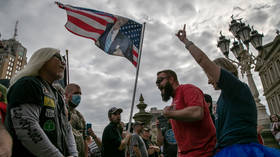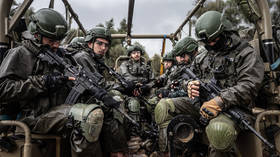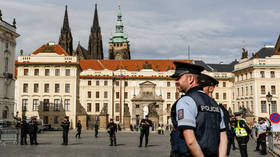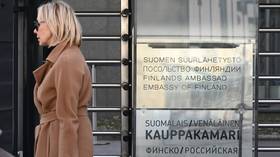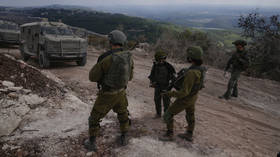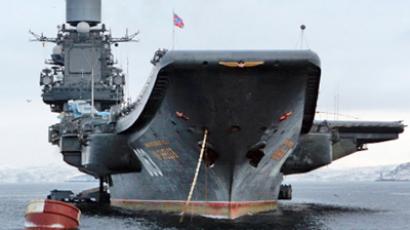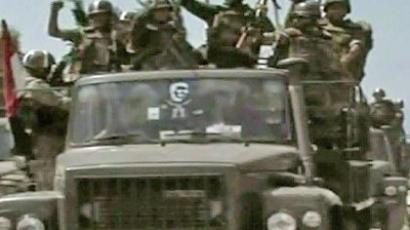UN rights watchdog demands Syria access
The top UN Human Rights Council has appointed an investigator to probe human rights abuses in Syria made public in the recently published UN report. However, Russia and China voted against the measure as they considered the UN report to be biased.
The 47-member council voted 37 in favor of a resolution that censured the Syrian government for the human rights violations and provided for the establishment of a special investigator on the matter. The vote came after the UN human rights chief urged for the referral of Syrian crimes to the International Criminal Court and said there was an urgent need for “international accountability” for crimes against humanity committed by Syrian forces.Among the crimes committed during the crackdowns, UN High Commissioner for Human Rights Navi Pillay highlighted the murder of at least 307 Syrian children.The Russian ambassador to the UN human rights office and other international organizations based in Geneva has doubted the credibility and objectivity of the document prepared by the UN human rights watchdog on the situation in Damascus.“The international community often gets unilateral, prejudiced and biased reports about the events in Syria,” Russia’s Interfax news agency quotes Valery Loshchinin as saying during the discussion at the UNHRC of the independent report accusing the Syrian authorities of crimes against humanity. “Unfortunately, this is the drawback of this report: it does not reflect the actual situation [in Syria]."UN human rights watchdog is debating the resolution at an urgent meeting of the 47-nation Human Rights Council in Geneva on Friday. It follows its declaration on Thursday that Syria was in a state of civil war due to the staggering death toll and the high number of soldiers defecting to the opposition.The US, the EU and the Arab League have slammed new sanctions on the Syrian regime, following a damning UN report and the climbing death toll that has reportedly exceeded 4,000 people since March.The new measures target Syrian VIPs and companies as well as the energy and financial sectors in the country. Damascus has already called the sanctions an economic war. The US has also blacklisted two more Syrian officials and two financial institutions.Brussels agreed to impose new sanctions on Syria's oil and financial sectors, and added 11 entities and 12 people to its list of those targeted by asset freezes and travel bans.The Arab League banned 17 Syrian VIPs from travel to Arab states, including President Bashar Assad's brother Maher, who commands the military's elite Republican Guard and is considered Syria's second most powerful man. President Assad was not named in the travel blacklist.Meanwhile, the opposition inside Syria has called for a general strike in an attempt to persuade the country's business elite to give up their ties with the government.Fergus Hodgson, a policy advisor with The Future of Freedom Foundation in the US, believes that the Western sanctions against Syria may eventually erupt into direct support of the dissidents."They will announce either support for the dissidents most likely or they can only harden these sanctions so much at the next point is basically an open attack either by funding the dissidents or giving military equipment to them by actually bringing some kind of peace-keeping force in and invading," he said.
On Thursday, the United Nations declared that Syria was in a state of civil war due to the staggering death toll and the high number of soldiers defecting to the opposition.“We are placing the figure at 4,000, but the information coming to us is that it’s much more,” Navi Pillay said at a news conference in Geneva. “As soon as there were more and more defectors threatening to take up arms, I said this in August before the Security Council, that there’s going to be a civil war. And at the moment that’s how I am characterizing this.”
But Ivan Eland, senior fellow at the Independence Institute,says the sanctions will only end up harming ordinary Syrians.“Most recent sanctions are directed at financial transitions but of course that affects the whole Syrian economy which the West, Turkey and the Arab League are now trying to buckle to reduced support for Assad,” he told RT.Eland believes that imposing sanction on unfavorable regimes could only fuel insurgencies across the world. “We have to be careful about undermining the sovereignty of countries with sanctions and military action,” he said. “It would be a disaster to attack Syria to get rid of Assad.”
Foreign affairs analyst Richard J. Heydarian, however, believes the West wants to use the sanctions and political pressure to force the Syrian regime into a dialogue and a smooth transition to a government, which will be friendlier to their interests. He gives his reasons why he thinks the UN condemnation will only remain symbolic and rhetorical. “Let’s remember in the case with Libya the West had possibly hundreds of millions of US dollars in terms of damages,” he told RT. “And Libya is a country which is very rich in hydrocarbon resources and the West was able to recoup its expenses in Libya by getting very favorable oil contracts in that country. In the case of Syria, we are not talking about the country rich in terms of hydrocarbon resources. So any kind of military intervention by Europe, by the West, which is already facing its own financial crisis and sovereign debt crisis, would be highly costly and in my opinion very improbable. So I think the West will really try to force new sanctions and political pressure and try to avoid direct military intervention. The only military trap I can think about is the Western countries possibly helping the Free Syrian Army with now forming coalition with the Syrian National Council to engage in some sort of military operations to weaken the Syrian army.”


